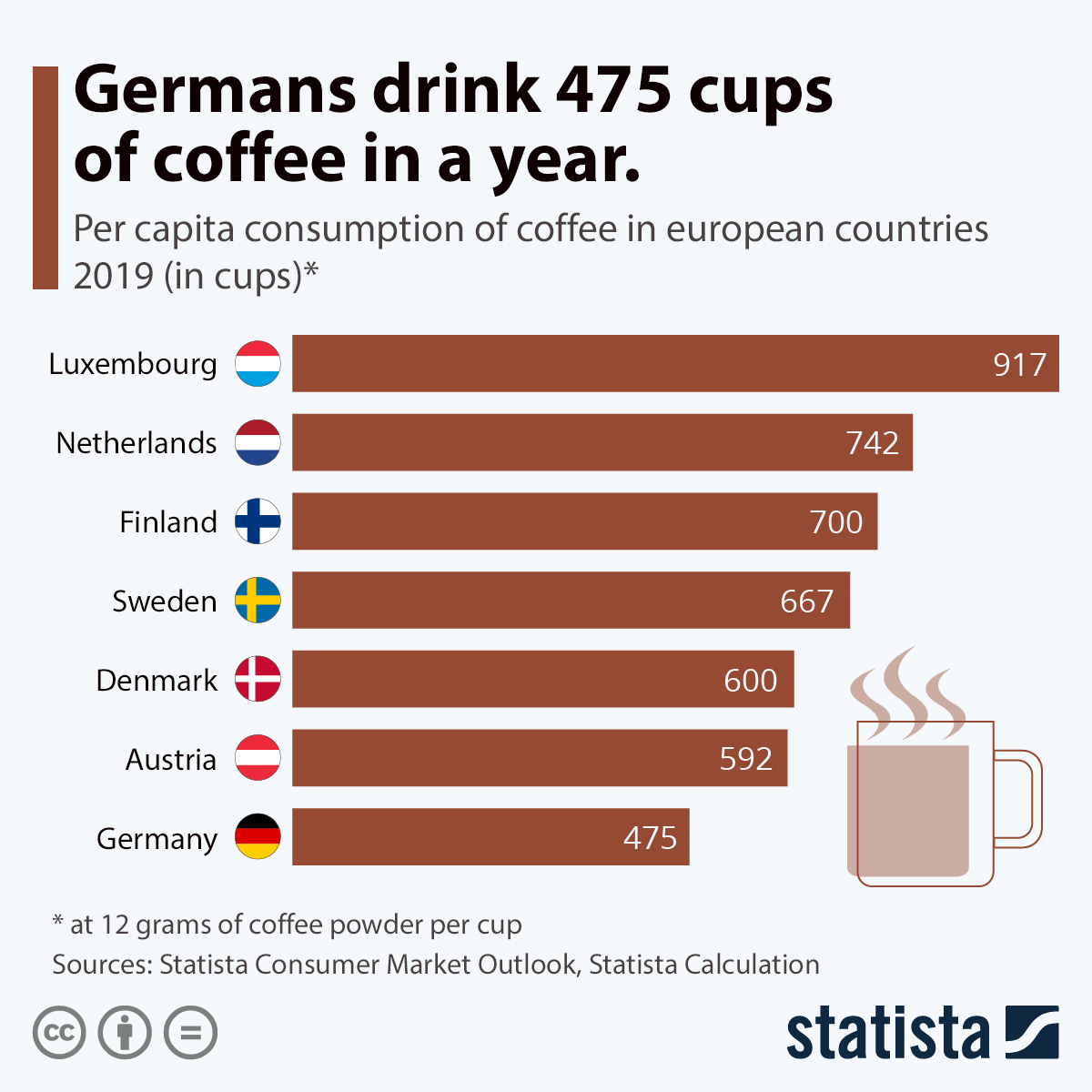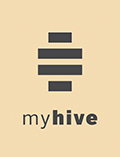Caffeine Kicks & Coffee Alternatives
Looking for the perfect caffeine kick? We've tracked down the best drinks and foods with caffeine!
Caffeine Kicks & Coffee Alternatives
Some of us are feel it as soon as we get up in the morning, others not until the afternoon after lunch: sleepiness. Sometimes you are simply demotivated, have slept badly or have had an exhausting conversation. All enough reasons to want to reach for an energy booster. When a walk in the fresh air is not possible to boost our energy, we like to turn to coffee or energy drinks. But there are so many delicious and healthy alternatives that we could be using for that kick too.
Coffee consumption in Europe
Coffee is probably the most popular drink when it comes to supposedly quick "pick-me-ups". Further below we will explain why this is a mistake and what you should watch out for when drinking coffee. But first, let's take a look at the top 7 coffee consumers in Europe. As of 2019, the inhabitants of Luxembourg are in the lead: with 917 cups of coffee per capita / year, they are the absolute frontrunners ahead of the Netherlands, Finland, Sweden, Denmark, Austria and Germany.

https://de.statista.com/infografik/19519/geschaetzter-pro-kopf-verbrauch-von-kaffee/
Why is coffee so popular?
Why do we love the black, bitter drink so much? On the one hand, it is certainly the varied taste and the enjoyment factor. Because from a strong espresso to a creamy latte or a refreshing iced coffee, there is something for everyone in the world of coffee. After all, there are also countless caffeine-free variants for those who drink coffee purely for pleasure and do not rely on its wake-up properties.
On the other hand, the aroma of freshly brewed coffee creates a feeling of well-being, coziness and relaxation. Many of us already know the scent of ground coffee beans from our childhood and inevitably think of the cozy and extended Sunday breakfast with the whole family when we smell it.
And then, of course, there is the habituation factor. When coffee is firmly integrated into the morning ritual and an espresso is part of the daily work routine after our lunch break with colleagues, we hardly think about why we are actually drinking coffee when we prepare and consume it.
Moreover, we assume that caffeinated drinks – no matter in what form - help us to feel more alert and concentrated and thus get us through the day more productively. Few people know that the immediate wakefulness kick is actually only a placebo effect. You can find out why in the next section.
When does the caffeine from coffee take effect?
As already mentioned, we usually assume that the first sip of coffee will wake us up on the spot. In reality, the opposite is true:
It takes about 30 minutes for the hormones adrenaline and cortisol, which are released by caffeine consumption, to enter the bloodstream and take effect. Depending on how high the individual's regular coffee consumption is, it may be that even a small cup of coffee is enough to show an effect. By the way, the effect is not only that you wake up, but also that your heart rate increases, you may feel nervous and it can even lead to increased sweating.
Before the coffee takes effect, however, it often produces an undesirable initial effect: it makes you tired. Yes, you read that right. Coffee often increases tiredness immediately after consumption. This is probably due to the fact that the hormones released by coffee increase the cross-section of the blood vessels and airways and thus initially lower the blood pressure and breathing rate, which is perceived as calming. Therefore, it makes perfect sense to take a short power nap after the first coffee and then be woken up by the effect of the caffeine.
What alternatives are there to coffee? Caffeine from tea, coffee, energy drinks and Co. in comparison
It is widely known that coffee is not the only source of caffeine. But the variety of alternatives to coffee drinks is still astonishing. Basically, so-called energy drinks have the highest possible caffeine content among beverages, at about 133 mg / 100 ml. However, we do not want to go into detail about these because of the health risks.
Let's take a look at another popular drink: Tea as a source of caffeine
It may be hard to believe, but a cup of black tea, at 50mg/100ml, has almost twice as much caffeine as a cappuccino, which has just 27mg per 100ml. Green tea and white tea contain less caffeine at 6-25mg/100ml, but have a longer and more lasting effect.
Tea is also said to be good against tooth decay and rheumatism. In general, however, it should be mentioned that teeth can easily become discolored due to an increased consumption of coffee or tea.
Soft drinks and lemonades as a coffee substitute?
If you prefer a cool drink on a hot day and don't feel like letting your cup of tea cool down first, you can turn to soft drinks with caffeine. These include primarily cola-based drinks and mate drinks. However, with 10-20 mg of caffeine per 100 ml, these contain less caffeine than coffee or black tea, but are usually drunk in much larger quantities. After all, who drinks half a litre of coffee? Since these soft drinks often contain sugar or sweeteners in addition to caffeine, they should remain an exception in your daily routine.
More alternatives to coffee
We have now looked at the well-known coffee alternatives, but there are also pick-me-ups that are not yet so well-known in most European countries. Here’s a list of 5 great alternatives:
- Guarana
- Contains caffeine that is released into the body in a staggered manner throughout the day.
- Should not be consumed pure, but mixed into a juice etc.
- Can also be added to savory dishes such as soups etc.
- Matcha
- Concentrate made from whole tea leaves
- Can be mixed into pastries, smoothies, muesli and savory dishes
- Has a stimulating and long-lasting effect
- Wheatgrass
- Great source of vitamins
- Not suitable for people with sensitive stomachs
- Ginger
- Improves digestion and stimulates the circulation due to the spiciness it contains.
- Is particularly healthy
- For ginger water: simply slice the ginger, pour boiling water over it and enjoy. For a refreshing twist in the summer let the mixure cool down, add some ice, a teaspoon of honey and some mint leaves.
- Fruits and vegetables in green smoothies
- Provide the body with valuable vitamins and minerals
- Fill you up and taste delicious
What is the maximum amount of caffeine one should consume per day?
For a healthy adult, who wants to consume caffeine in moderation and responsibly, the general recommendation is that you should consume a maximum of 5.7 mg of caffeine per kilogram of your own body weight per day. This means that a person weighing 60kg should not consume more than 342mg of caffeine.
Converted to our most popular caffeine drinks, this means for an example weight of 60kg:
- 427 ml black coffee
- 310 ml espresso
- 684 ml black tea
- 1368 ml green tea
Conclusion: It doesn't always have to be coffee
If you are tired and want to get yourself out of a midday slump, you don't always have to turn to coffee. It makes sense to find out the cause of the tiredness and to do something about it. A power nap can help with a lack of sleep, and if you haven't eaten enough fresh fruit and vegetables, you should think about your own vitamin and mineral balance. Green smoothies, ginger water and wheatgrass are quick helpers too. Tea is also a great coffee alternative.
As a general rule, we recommend taking care of a balanced sleep-wake rhythm, not consuming too much caffeine and instead of a quick espresso, simply taking a short walk in the fresh air and in the sun to fill up on some natural Vitamin D.
Szeretne többet megtudni a myhive-ról?
Foglalja le látogatását és tudjon meg többet.
